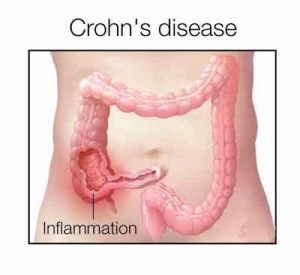- Home
- Editorial
- News
- Practice Guidelines
- Anesthesiology Guidelines
- Cancer Guidelines
- Cardiac Sciences Guidelines
- Critical Care Guidelines
- Dentistry Guidelines
- Dermatology Guidelines
- Diabetes and Endo Guidelines
- Diagnostics Guidelines
- ENT Guidelines
- Featured Practice Guidelines
- Gastroenterology Guidelines
- Geriatrics Guidelines
- Medicine Guidelines
- Nephrology Guidelines
- Neurosciences Guidelines
- Obs and Gynae Guidelines
- Ophthalmology Guidelines
- Orthopaedics Guidelines
- Paediatrics Guidelines
- Psychiatry Guidelines
- Pulmonology Guidelines
- Radiology Guidelines
- Surgery Guidelines
- Urology Guidelines
Ustekinumab Reduces Crohn's Disease Related Hospitalization and Surgery

Treatment with Stelara (ustekinumab) lowered the risk of Crohn's disease-related hospitalization, surgery, and the need for alternative biologic therapy in patients with the moderate-to-severe Crohn's disease (CD) when compared with placebo, according to Phase 3 IM-UNITI study.
Janssen Pharmaceutical, part of Johnson & Johnson, presented new long-term findings from its two-year IM-UNITI extension Stelara (ustekinumab) program, at 2018 in Washington DC.
Stelara interferes with the triggering of the body's inflammatory response through the suppression of certain cytokines. Specifically, it blocks interleukin IL-12 and IL-23 which help activate certain T-cells.
The study included patients with the moderate-to-severe CD from the UNITI-1 and UNITI-2 trials who had achieved clinical response after a single intravenous (IV) dose of ustekinumab and entered five years of long-term observation. Patients were randomized to receive either placebo or subcutaneous (SC) ustekinumab 90mg q12w or q8w. Incidences of hospitalization, surgery or initiation of an alternative biologic (TNF-antagonist or anti-integrin therapy) were assessed at 96 weeks. The IM-UNITI LTE trial is ongoing
The study found that the patients receiving Stelara every 12 weeks for two years were 52% less likely to be admitted to hospital or require surgery than patients treated with placebo. Patients receiving the medication every eight weeks were 40% less likely to experience either of these endpoints. Patients in the every-eight-weeks group were 53% less likely to switch to an alternative biologic compared to the placebo group. The every-12-weeks group saw a risk reduction of 33%, but statistical significance was not reached.
Crohn’s disease can have a significant impact on patients, with most having multiple relapses and many experiencing complications that require intervention. These long-term data from IM-UNITI are particularly encouraging for clinicians as they demonstrate that treatment with ustekinumab reduced the need for hospitalization, surgery or a switch to another treatment”, said Professor William Sandborn, MD, study investigator and Chief of Gastroenterology, UC San Diego Health System.
The FDA approved Stelara in 2016 for the treatment of moderately to severely active Crohn’s disease in adults who have failed or were intolerant to treatment with immunomodulators or corticosteroids but never failed treatment with a tumor necrosis factor (TNF) blocker, or who failed or were intolerant to treatment with one or more TNF blockers.
Crohn's disease is an inflammatory bowel disease (IBD). It causes inflammation of the digestive tract, which can lead to abdominal pain, severe diarrhea, fatigue, weight loss, and malnutrition. Crohn's disease patients may require surgery due to the damage that the disease causes to the bowel, presenting as ulcers, scarring, narrowing of the gastrointestinal tract and abnormal connections between different parts of the track.

Disclaimer: This site is primarily intended for healthcare professionals. Any content/information on this website does not replace the advice of medical and/or health professionals and should not be construed as medical/diagnostic advice/endorsement or prescription. Use of this site is subject to our terms of use, privacy policy, advertisement policy. © 2020 Minerva Medical Treatment Pvt Ltd